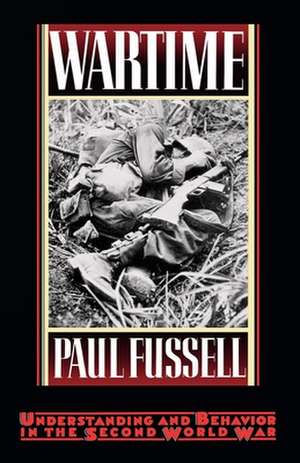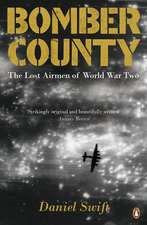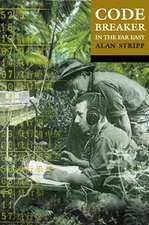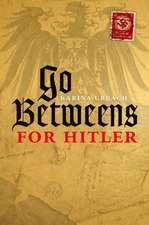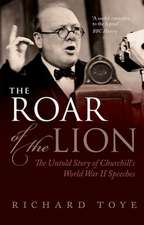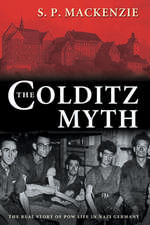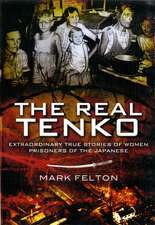Wartime
Autor Paul Fussellen Limba Engleză Paperback – 30 sep 1990
Now, in Wartime, Fussell turns to the Second World War, the conflict he himself fought in, to weave a narrative that is both more intensely personal and more wide-ranging. Whereas his former book focused primarily on literary figures, on the image of the Great War in literature, here Fussell examines the immediate impact of the war on common soldiers and civilians. He describes the psychological and emotional atmosphere of World War II. He analyzes the euphemisms people needed to deal with unacceptable reality (the early belief, for instance, that the war could be won by "precision bombing," that is, by long distance); he describes the abnormally intense frustration of desire and some of the means by which desire was satisfied; and, most important, he emphasizes the damage the war did to intellect, discrimination, honesty, individuality, complexity, ambiguity and wit. Of course, no Fussell book would be complete without some serious discussion of the literature of the time. He examines, for instance, how the great privations of wartime (when oranges would be raffled off as valued prizes) resulted in roccoco prose styles that dwelt longingly on lavish dinners, and how the "high-mindedness" of the era and the almost pathological need to "accentuate the positive" led to the downfall of the acerbic H.L. Mencken and the ascent of E.B. White. He also offers astute commentary on Edmund Wilson's argument with Archibald MacLeish, Cyril Connolly's Horizon magazine, the war poetry of Randall Jarrell and Louis Simpson, and many other aspects of the wartime literary world.
Fussell conveys the essence of that wartime as no other writer before him. For the past fifty years, the Allied War has been sanitized and romanticized almost beyond recognition by "the sentimental, the loony patriotic, the ignorant, and the bloodthirsty." Americans, he says, have never understood what the Second World War was really like. In this stunning volume, he offers such an understanding.
| Toate formatele și edițiile | Preț | Express |
|---|---|---|
| Paperback (1) | 129.69 lei 3-5 săpt. | |
| Oxford University Press – 30 sep 1990 | 129.69 lei 3-5 săpt. | |
| Hardback (1) | 181.35 lei 31-37 zile | |
| OUP OXFORD – 28 sep 1989 | 181.35 lei 31-37 zile |
Preț: 129.69 lei
Nou
Puncte Express: 195
Preț estimativ în valută:
24.82€ • 25.96$ • 20.61£
24.82€ • 25.96$ • 20.61£
Carte disponibilă
Livrare economică 12-26 martie
Preluare comenzi: 021 569.72.76
Specificații
ISBN-13: 9780195065770
ISBN-10: 0195065778
Pagini: 352
Dimensiuni: 135 x 219 x 22 mm
Greutate: 0.45 kg
Ediția:Revised
Editura: Oxford University Press
ISBN-10: 0195065778
Pagini: 352
Dimensiuni: 135 x 219 x 22 mm
Greutate: 0.45 kg
Ediția:Revised
Editura: Oxford University Press
Descriere
Winner of both the National Book Award for Arts and Letters and the National Book Critics Circle Award for Criticism, Paul Fussell's classic The Great War and Modern Memory remains one of the most original and gripping volumes ever written about the First World War. In its panoramic scope and poetic intensity, it illuminated a war that changed a generation and revolutionized the way we see the world. Now, in Wartime, Paul Fussell turns to the Second World War, the conflict in which he himself fought, to weave a more intensely personal and wide-ranging narrative. Whereas his former book focused primarily on literary figures, here Fussell examines the immediate impact of the war on soldiers and civilians. He compellingly depicts the psychological and emotional atmosphere of World War II by analyzing the wishful thinking and the euphemisms people needed to deal with unacceptable reality; by describing the abnormally intense frustration of desire and some of the means by which desire was satisfied; and, most importantly, by emphasizing the damage the war did to intellect, discrimination, honesty, individuality, complexity, ambiguity, and wit. Of course, no book of Fussell's would be complete without serious attention to the literature of the time. He offers astute commentary on Edmund Wilson's argument with Archibald MacLeish, Cyril Connolly's Horizon magazine, the war poetry of Randall Jarrell and Louis Simpson, and many other aspects of the wartime literary world. In this stunning volume, Fussell conveys the essence of that war as no other writer before him has.
Recenzii
"Really makes the war come alive and [is] more meaningful for the students."--Paul R. Waibel, Belhaven College |k No
Notă biografică
Paul Fussell is Donald T. Regan Professor of English at the University of Pennsylvania. He is the author of nine other books, including The Great War and Modern Memory, Abroad: British Literary Traveling Between the Wars and The Boy Scout Handbook and Other Observations
